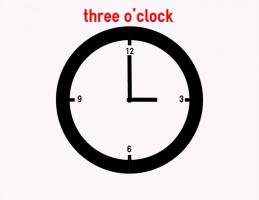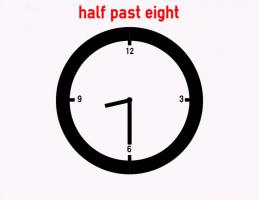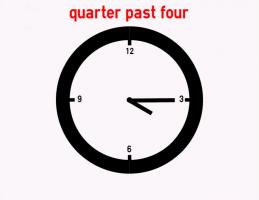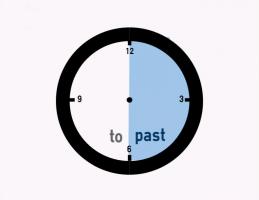Tempo (ieri, oggi, domani) in inglese
Iscriviti gratuitamente per avere tutte le informazioni sulle lezioni private e sui nostri corsi di gruppo disponibili (A1, A2, B2, B2, C1, C2)
Registrati gratisIscriviti gratuitamente per avere tutte le informazioni sulle lezioni private e sui nostri corsi di gruppo disponibili (A1, A2, B2, B2, C1, C2)
Registrati gratisQuesta è una lezione sul tempo (time) e sulle espressioni ad esso attinenti in inglese.
Nella seguente tabella, troverete tutte le espressioni più usate circa il tempo in inglese.
Segui lezioni di lingua online con un insegnante professionista
In questa tabella troverete i nomi riguardanti i momenti della giornata (day).
| Inglese | Italiano |
|---|---|
| The previous day | Il giorno precedente |
| The day before yesterday | L'altroieri |
| Yesterday | Ieri |
| Today | Oggi |
| Tomorrow | Domani |
| The day after tomorrow | Dopodomani |
| The following day | Il giorno successivo |
Qui troverete le espressioni comuni riguardanti i momenti della giornata.
| Inglese | Italiano |
|---|---|
| Morning | Mattina |
| Noon / midday | Mezzogiorno |
| Afternoon | Pomeriggio |
| Evening | Sera |
| Night | Notte |
| Midnight | Mezzanotte |
| Yesterday morning | Ieri mattina |
| Yesterday afternoon | Ieri pomeriggio |
| Yesterday evening | Ieri sera |
| Last night | Ieri notte |
| This morning | Stamattina |
| This afternoon | Questo pomeriggio |
| This evening | Stasera |
| Tonight | Stanotte |
| Tomorrow morning | Domattina |
| Tomorrow afternoon | Domani pomeriggio |
| Tomorrow evening | Domani sera |
| Tomorrow night | Domani notte |
![]() Ricordate! Quando si fa riferimento a un punto della giornata, la preposizione da usare è in:
Ricordate! Quando si fa riferimento a un punto della giornata, la preposizione da usare è in:
e.g. In the morning (Di mattina); In the afternoon (Di pomeriggio); In the evening (Di sera).
Ripassate le grammatica inglese sulle nostre pagine sulle preposizioni e sugli avverbi di tempo!
Nella tabella seguente, troverete le altre espressioni utili per specificare i momenti del mese (month) e dell'anno (year).
| Inglese | Italiano |
|---|---|
| Last week | La settimana scorsa |
| A week ago | Una settimana fa |
| Two weeks ago | Due settimane fa |
| The previous weeks | Le settimane precedenti |
| Last month | Lo scorso mese |
| A month ago | Un mese fa |
| Two months ago | Due mesi fa |
| The previous months | I mesi precedenti |
| Last year | L'anno scorso |
| A year ago | Un anno fa |
| Two years ago | Due anni fa |
| The previous years | Gli anni precedenti |
| This week | Questa settimana |
| This month | Questo mese |
| This year | Quest'anno |
| Next week | La prossima settimana |
| The following week | La settimana successiva |
| Next month | Il mese prossimo |
| The following month | Il mese successivo |
| Next year | L'anno prossimo |
| The following year | L'anno successivo |
In questa tabella troverete altre importanti espressioni di tempo.
| Inglese | Italiano |
|---|---|
| A long time ago | Molto tempo fa |
| An hour ago | Un'ora fa |
| In five minutes | Tra cinque minuti |
| In an hour | Tra un'ora |
| In a week | Tra una settimana |
| In ten years | Tra dieci anni |
| Sorry, I don't have much time. | Non ho molto tempo, scusami. |
| Sorry, I am in a hurry! / I am in a rush! | Sono di fretta, scusami! |
| It's been a long time! | Da quanto tempo! |
| For how long? | Per quanto tempo? |
| What a long time since we saw each other. | Da quanto tempo non ci vediamo! |
| For a short time / for a little while | Per poco tempo |
| Free time / Leisure / Spare time | Tempo libero |
| Full-time | A tempo pieno |
| Waste time | Perdere tempo |
| Use time | Impiegare il tempo |
| Pass the time / Kill time | Ammazzare il tempo |
| Clock's ticking | Il tempo stringe |
| When you have time / When you get a chance | Quando hai tempo! |
Ci sono molti modi per chiedere l'ora in inglese. Ecco i principali.
| Inglese | Italiano |
|---|---|
| What time is it? | Che ore sono? |
| What's the time? | Che ora è? |
| Could you tell me the time, please? | Mi può dire l'ora, per favore? |
| Do you happen to have the time? | Sa per caso che ore sono? |
| Do you know what time it is? | Sa che ora è? |
Per dire l'ora in inglese, invece, si usano le espressioni presenti nella seguente tabella.
L'orologio è chiamato watch o clock.

| Italiano | Inglese |
|---|---|
| Sono le tre in punto. (15:00) | It's three o'clock. |
| Sono le nove del mattino. (09:00) | It's nine a.m. |
| Sono le sei del pomeriggio. (18:00) | It's six p.m. |

| Italiano | Inglese |
|---|---|
| Sono le otto e mezza. (08:30) | It's half past eight. |
| Sono le sei e mezza del pomeriggio. (18:30) | It's half past six p.m. |
| Sono le undici e mezza del mattino. (11:30) | It's half past eleven a.m. |

| Italiano | Inglese |
|---|---|
| Sono le quattro e un quarto. (16:15) | It's quarter past four p.m. |
| Sono le sette e un quarto del mattino.(7:15) | It's quarter past seven. |
| Sono le due meno un quarto. (1:45) | It's quarter to two. |
| Sono le undici meno un quarto. (10:45) | It's quarter to eleven. |

Per indicare i minuti antecedenti la mezz'ora, si usa past. Per quelli che invece superano il 31esimo minuto fino alla fine dell'ora, si usa to.
| Italiano | Inglese |
|---|---|
| Sono le quattro e sette. (16:07) | It's seven minutes past four. |
| Sono le due e venti. (2:20) | It's twenty minutes past two. |
| Sono le cinque meno undici. (4:49) | It's eleven minutes to five a.m. |
| Sono le sei e trentatré. (6:33) | It's twenty-seven minutes to seven. |
| Inglese | Italiano |
|---|---|
| It's about one o'clock p.m. | È all'incirca l'una del pomeriggio |
| It's exactly noon | È esattamente mezzogiorno |
| It's almost three a.m. | Sono quasi le tre del mattino |
| It's just gone four p.m. | Sono appena passate le quattro del pomeriggio. |
Per dire bene l'ora, controllate le lezioni di grammatica sui numeri in inglese!
Sofia: Hi, Sally! It's been long time!
Sofia: Ciao, Sally! È passato un sacco di tempo!
Sally: Oh, hello, Sofia! Sorry, I didn't see you! Yeah, you're right! How are you?
Sally: Oh, ciao Sofia! Scusa, non ti avevo detto! Sì, hai ragione! Come stai?
Sofia: I am fine, thanks! And you? Are you in a rush? Could we speak just for a little while?
Sofia: Sto bene, grazie! E tu? Sei di fretta? Puoi parlare giusto un po'?
Sally: Actually, I don't have much time, but don't worry. It's a pleasure to see you. What are you doing here?
Sally: Beh, in realtà non ho molto tempo, ma non ti preoccupare. È un piacere vederti. Che stai facendo qui?
Sofia: Well, today I have some spare time, so this morning I decided to come here to shop. And you?
Sofia: Beh, oggi ho un po' di tempo libero, quindi stamattina ho deciso di venire qui a fare compere. E tu?
Sally: I am okay, I'm going to see a friend of mine. Two weeks ago she called me and we are suppose to see each other this afternoon. But talking about you... What a long time since we saw each other!
Sally: Io sto bene. Sto andando da una mia amica. Due settimane fa mi ha chiamato e dovremmo vederci questo pomeriggio. Ma parlando di te... da quanto tempo non ci vediamo?
Sofia: Well, at least seven months! I have great news indeed! In a week I will start my new full-time job!
Sofia: Beh, almeno sette mesi! Infatti ho ottime notizie! Tra una settimana comincerò un nuovo lavoro a tempo pieno!
Sally: Oh, wow, that's great! I remember that an year ago you were looking for it, right?
Sally: Oh, wow, fantastico! Mi ricordo che un anno fa lo stavi cercando, vero?
Sofia: Exactly! I spent the following months searching and finally I read the announcement for this job about two months ago. Then, after three weeks, I had the job interview.
Sofia: Esattamente! Ho impiegato i mesi seguenti cercando e finalmente ho letto l'annuncio per questo lavoro circa due mesi fa. Poi, dopo due settimane, ho avuto il colloquio.
Sally: Congratulations! I am really happy for you. Oh, Gosh, clock's ticking! Do you happen to have the time?
Sally: Congratulazioni! Sono molto felice per te. Oh, accidenti, il tempo passa! Sai per caso che ora è?
Sofia: Yes! It's a quarter past four!
Sofia! Yes, sono le quattro e un quarto!
Sally: Oh, sorry, I have to run! I must be at my friend's place in five minutes! When you get a chance we could take a coffee together!
Sally: Oh, scusa, devo correre! Devo essere a casa della mia amica tra cinque minuti! Quando hai tempo ci potremmo prendere un caffè!
Sofia: Yeah, it would be wonderful! Maybe the next week-end. Bye!
Sofia: Sì, sarebbe bello! Magari il prossimo week.end. Ciao!